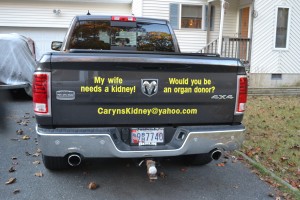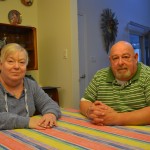
BERLIN – Proud parent of an honor student. I love my golden retriever. My wife needs a kidney.
Which message would make you look twice?
While drivers these days are inundated with bumper stickers and decals as they sit in traffic, Arie Klapholz is hoping the more serious message shared on his vehicle will generate some interest. It’s hard to miss the bright yellow lettering advertising the fact that his wife needs a kidney and providing contact information.
“Our mission is to get our request out,” Klapholz said. “Hopefully we’ll find somebody.”
Klapholz and his wife Caryn, originally from Philadelphia, have lived in Ocean Pines since 2003. Their idyllic retirement was interrupted abruptly five years ago when Caryn got a small infection in her toe. Small enough that she wasn’t even aware of it until her she woke up one morning with a swollen foot.
“Overnight it turned into MRSA (Methicillin-resistant Staphylococcus aureus) then sepsis then septic shock,” Klapholz recalled. “It went up to her knee.”
Caryn was quickly transferred from Atlantic General Hospital to the University of Maryland Medical Center. After several weeks there, doctors were finally able to stop the gradual shutdown of her body’s organs. Though she was eventually deemed healthy enough to head home to the Pines, Caryn was diagnosed with CKD — chronic kidney disease. Her kidneys, the organs tasked with filtering her blood, were gradually shutting down.
In spite of the diagnosis, her condition stayed steady until last year. At that point, doctors told her she had stage five CKD — she’d soon need dialysis to survive.
“They said it was inevitable,” she said.
It was then that Caryn was outfitted with a peritoneal port — essentially a catheter buried in the skin — in her chest as well as her arm. They’ll be used for dialysis.
Klapholz said that while dialysis has been described as unavoidable for his wife, it’s something that won’t occur until absolutely necessary.
“Medical people are afraid to put you on dialysis because you end up being tied to a machine,” he said. “Your quality of life is in the toilet.”
Because of that, Caryn’s medical team encouraged the couple to pursue a kidney transplant. They wasted no time putting her on the transplant list but were discouraged to find out that typically came with a three to six year wait. It was then they started looking into finding a live donor.
Health complications, such as diabetes and cancer, ruled out Klapholz and the rest of Caryn’s family as potential donors, so six months ago they decided to share her story with the community. Klapholz told members of his golf group, his synagogue and even the Ocean Pines Association. When he saw the story of how a child’s poster led to the boy’s mother finding a donor, Klapholz decided to put his family’s request in writing — on the back of his pickup truck.
“My wife needs a kidney!” his tailgate now reads. “Would you be an organ donor? [email protected].”
While it hasn’t resulted in a potential donor yet, Klapholz said the message has generated plenty of attention. On a recent trip to visit family in Texas, he received emails from individuals interested in sharing a photo of the back of his truck through their social media pages. He’s grateful for their help.
“The biggest thing is finding someone willing to give one up,” he said. “Somebody who’s altruistic and motivated.”
He said that while being a donor was more than an overnight procedure, there was little risk associated with it. A live donor would, however, have a great impact on Caryn’s health.
According to the University of Maryland Medical Center, the life expectancy of patients who undergo a kidney transplant is longer than that of those who are on dialysis. In addition, quality of life is improved. Transplants from live donors typically function better and are associated with a lower rate of rejection than those from deceased donors.
Though Klapholz’s efforts to drum up a donor haven’t proved fruitful yet, he says it could happen.
“You never know,” he said.
In the meantime, he and Caryn will continue att

Chronic kidney disease has disrupted the planned retirement of Caryn and Arie Klapholz, Ocean Pines residents for 12 years.
ending seminars and joining renal support groups. Caryn is optimistic that one day she’ll move from being a member of the audience to one of those speaking about her transplant.
“You hear story after story,” she said. “Everybody says after they’ve had it done they feel like a new person.”
Anyone interested in being a donor can contact Klapholz at 410-208-0362 or email [email protected].

